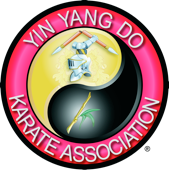Dojo Etiquette
The word dojo in the Japanese language translates into a training hall. Inside this training hall is where karate practitioners train. The Korean arts may also call this training hall Do-Jang. There are strict rules, traditions, and personal conduct that are adhered to inside a dojo. We have listed many of the rules and traditions that our association follows.
It is customary to bow upon entering and exiting the dojo.
Punctuality for the class is desired, if a student shows up late for class, the student should wait at the opening to the dojo until recognized by the Sensei. The student once recognized should bow; enter the dojo and take his/her place in the training area. If a student knows he/she will be late for class or has to leave early this should be conveyed to the Sensei prior to the class.
The dojo is a learning environment; it is the ultimate goal for all students to provide a positive learning environment and should treat each other with respect, both in and out of the dojo. “Leave your ego at the door”.
Shoes are not to be worn in the training area, mat at any time and should be removed before stepping in the dojo.
Horseplay will not be tolerated.
Always bow to your partner before and after an exercise.
Karate Gi’s will be clean and in good condition. It is a sign of disrespect to wear torn uniforms.
The obi (belt) is also part of your uniform and should be respected.
Never wash the obi, air it out after class.
If your obi comes untied during training stop and retire (always face the rear of the dojo).
Never let your obi drop to the floor.
Personal Hygiene is required since we work closely together. If your job is physically demanding please shower prior to class.
Students must always keep their finger and toenails clipped and clean. (This is to prevent unwanted injuries to other students and yourself.)
No cursing in any part of the dojo at any time.
Report all injuries to Sensei immediately.
Never interrupt Sensei or Sempais if they are speaking to someone else.
(Unless it’s an emergency)
When you are given directions or an order always sound-off loudly with yes Sensei.
When you are told to line-up or move to another location of the dojo, do it as fast as possible.
Support your dojo; get involved with events and activities (newsletter, committees, seminars, trips, etc.).
Everyone should strive to give 100% of themselves in every class.
If you are reaching your physical limit in class do not push above it. This may only cause injury, resulting in a setback in your training. If you have an injury that limits your participation, please advise a senior. DO ONLY WHAT YOU CAN.
Upper belts should set an example for the lower belts by adhering to the rules of the dojo. However, it is not your job to punish or ridicule a lower belt for breaking them, simply inform or remind them of the rule.
It is important to have respect for the art that we study, the past
master, the present masters as well as the dojo instructors and fellow practitioners.
A large part of that respect is shown in the attitude and actions of the
student. Certain rituals are demanded by mere tradition but serve only for a better understanding of the traditional art.
Always address the head instructor as Sensei.
Always pay strict attention to the instructor and not to other distractions.
Never leave the class for a break, water, or any early dismissal, except with permission.
Students should remove all jewelry before class, for their own safety and that of others.
No smoking, profanity or gum in the dojo.
Practice what you are taught.
Never lose your temper in the dojo, especially in self-defense, or free sparring.
Never talk during class except to ask or answer questions, or to discuss karate
As a sign of respect and responsibility, dues should be paid on time.
